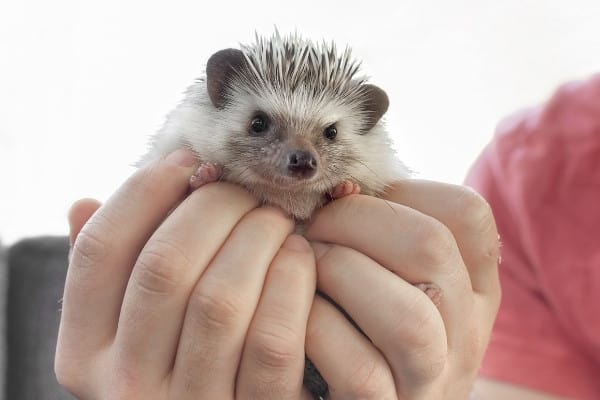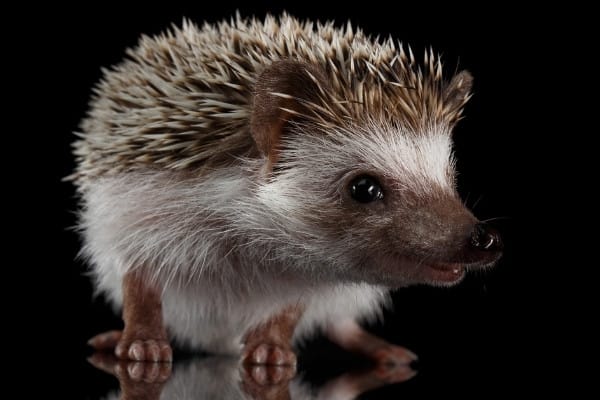
When we think of hedgehogs, it’s hard not to picture them curled up in a ball, content to sleep for days – which might lead you to assume that they don’t need much light to thrive.
Do hedgehogs need light? Hedgehogs need at least 12 hours of light a day as this reflects the day-and-night cycle of their natural habitat. Because natural light can be inconsistent for domestic hedgehogs, sunlight must be supplemented with artificial lighting to maintain health and avoid induced hibernation.
Yes, hedgies are nocturnal animals, but light plays quite an important role in their biology.
Hedgies kind of have the reversed version of our human circadian rhythm which can be hard to get your head around as a first-time owner.
To shed some light (no pun intended) on the situation, we’ve answered the Whys and Hows of providing light for your hedgehog, plus some commonly asked queries relating to light and sleeping habits.
Lighting Requirements for Hedgehogs
Your hedgehog operates on a 12 hour day-and-night cycle so it’s essential to maintain a consistent source of daylight with supplemental artificial lighting and a timer.
When “daylight” as a hedgehog knows it becomes too short, this can trigger hibernation attempts which can have serious health consequences, including death.
Why Hedgehogs Need Light
Hedgehogs are nocturnal, meaning they are active at night, but this does not mean they don’t require light to function.
They require and respond to light cycles in the same way as any animal, and many vital biological events such as hormone production, internal body temperature, and cell regeneration rely upon this pattern.
A 2019 research paper published by the Journal of Hepatology explains that even a hedgehog’s organ tissue “adapts to the rhythmic cycles of feeding and activity” as set by their natural light-dark cycle.
Also it was found that “experimental evidence has demonstrated that the interruption or deviation from this circadian rhythm increases the risk for various types of disease, and may even contribute to obesity and cancer.”
How Much Light Hedgehogs Need Each Day
Twelve to 14 hours is the recommended amount of light for hedgehogs to help replicate their natural cycle, so a typical schedule might look like this:
Lights turn on at 8 am and off at 10 pm – during which time they will mostly be asleep to conserve energy.
A seasoned owner on the care forum Hedgehog Central suggests:
“Think of them like vampires. When the ‘sun’ (aka, their light) is out, they’re asleep inside their hideout house (coffin), then when the sun goes away, they come out!”
If we take this schedule as an example, you can be there for playtime and bonding with your hog by dimming the lights down at around 9 pm to signal that it’s time to wake up.
As we’ve established, it’s crucial that you don’t stray too far from this type of light-dark routine.
How To Ensure Your Hedgehog Receives Enough Daily Light

Natural sunlight will provide a decent dose of daily light but you will need to supplement this with artificial lighting to make up the minimum 12 hours needed.
Before we get into the ideal lighting setup, we should stress that a hedgehog should never be kept in the following conditions:
- Basements
- Windowless rooms
- Closets
- Direct sunlight
Ideal sources of artificial light can be regular desk lamps and dome light fixtures (between 50 and 75 watt bulbs), which can often be clipped directly onto their cage.
LED lamps and light strips are also suitable, though colored light bulbs or infrared lighting are best avoided as this tends to make some hedgehogs inactive, according to some owners.
While low heat levels are the main hibernation trigger, reduced daylight hours can initiate the same instinct in your hedgehog, which can spell health complications in most and even prove fatal for the smallest domestic species – the African pygmy hedgehog.
Because they lack the fat deposits to successfully hibernate, AP hedgehogs will become immunocompromised and eventually starve.
To ensure your hedgehog receives enough daily light without fail, regulate light patterns with the aid of a lamp timer to automatically set and shut off their daylight hours.
If you don’t have one already, this digital timer is ideal. Easy programming, manual override function, large screen with clear settings, and side-entry plug design. Perfect!
No products found.
Do Hedgehogs Need Light at Night?
As they are naturally nocturnal, hedgehogs are better adapted to the dark and will not require light at night as this will risk disrupting their light-dark circadian rhythm.
Does Light Bother Hedgehogs?
No, 12-14 hours of light is part of their evolution and keeps their biological clock in check.
Hedgehogs are also unaffected by supplemental nighttime light, according to a 2020 study into the effects of artificial lighting on European hedgehog activity, which concluded that it had “no effect on their feeding or general activity.”
Do Hedgehogs Need Sunlight?
Hedgehogs can benefit from the additional vitamin D provided by sunlight, but it is not as crucial for their health and well-being.
As nocturnal insectivores, hedgehogs are naturally very efficient at processing essential vitamins.
Do Hedgehogs Need a Lamp?
Yes, it is essential that you place a lamp light on or near their cage to supplement the natural daylight hours as the days grow shorter throughout fall and winter.
Lamps should also be used in naturally low-light homes, regardless of the season, since you must provide at least 12 hours of daily light.
Can Hedgehogs See in the Dark?

Hedgehogs can see in the dark. Though their eyesight is poor, hedgehogs have sharper vision at night than they do during daylight hours.
To compensate for slightly poor eyesight, they also possess sharper senses of hearing and smell to help them hunt and forage in their wild habitat.
How Many Hours Does a Hedgehog Sleep?
Adult hedgehogs typically sleep up to 18 hours a day while babies (0-5 months old) can sleep for 20 hours or more.
This is perfectly normal due to their nocturnal behavior and can sometimes overlap day and night, allowing them roughly 4-6 hours of feeding/playing time.
Do Hedgehogs Hibernate?
Wild hedgehogs hibernate from late December to late March in response to consistently low temperatures and a lack of food availability.
To survive the harsh winter, they slow down their metabolism and heart rate to just 20 bpm (beats per minute).
Due to comfortable room temperatures and a reliable food supply, domestic hedgehogs have no reason to hibernate and should never be encouraged to do so.
Why Is My Hedgehog Out During the Day?
A hedgehog’s sleeping pattern varies slightly in accordance with the weather, so if your hedgehog is out during daylight hours, it could be in response to warmer summer weather in which they may sleep as little as 8 hours.
Pregnant or nursing hedgehogs are also seen during the day due to their nesting and food-hunting instinct.
Disturbances to their normal routine, such as loud music or heavy machinery operating outside, could also cause them to leave their beds, perhaps in search of a quieter location.
Of course you want your hedgie to be as comfortable and happy as possible. Check out our article on Hedgehog Cage Setup to be sure you’re not missing any essentials.
Related Questions:
Do Hedgehogs Need a Heat Lamp?
Yes, hedgehogs will benefit from a heat lamp to help regulate the temperature in their enclosure to a comfortable 72-80°F range.
Choose a ceramic heat emitter (CHE) as this only emits heat, not light that could confuse them into thinking it is daytime and disrupt their circadian rhythm.
Pair those bulbs with a reflector dome, thermometer, and thermostat, and you’re all set.
- 【Fast Response】The Fast Response That Measures Every 10 Seconds With 4 Sensitive VENTS to...
- 【High Accuracy】Advanced Humidity&Temperature sensor maintains accuracy to +/- 1% ; Temperature...
- ✓ EFFORTLESS SET UP: Just using 3 buttons on this BN-LINK reptile thermostat to complete desired...
- ✓ EASE OF MIND: BN-LINK temperature controller comes with a convenient hanging tab and bright,...
Do Hedgehogs Need Chew Toys?
No. Unlike rodents, a hedgehog’s teeth do not continue to grow and won’t require filing down, so chew toys may actually risk breaking their adult teeth.
Hedgehogs prefer exercise wheels and toys that allow them to forage and burrow with their feet such as dig boxes.
Conclusion
To summarize, light is vital to a hedgehog’s overall health and well-being as they require a 12-hour-day, 12-hour-night cycle to regulate essential bodily processes.
As nocturnal creatures, they will sleep during the day and require a minimum of 12 hours “daylight” as they do, which can be provided with a combo of natural and artificial lighting.
Respecting this consistent light-dark schedule is crucial to prevent unwanted hibernation in your hedgie.
Sources:
https://africanpygmyhedgehogs.com/2019/09/02/do-african-pygmy-hedgehogs-need-a-heat-lamp/
http://hedgehogkeeper.com/do-hedgehogs-need-heat-lamps/
https://www.hedgehogcentral.com/threads/hedgehog-lighting-questions.109386/
http://blog.critterconnection.cc/are-hedgehogs-nocturnal-crepuscular-or-diurnal/
https://www.hedgehogworld.com/hedgehog-hibernation/
https://www.exoticdirect.co.uk/news/pygmy-hedgehog-setup
https://www.applevalleyhedgehogs.com/lighting-and-heating
https://www.hedgehogcentral.com/threads/chews-and-toys.56569/
Last update on 2024-04-25 at 00:59 / Affiliate links / Images from Amazon Product Advertising API







